【论文】浅谈国际商务合同的翻译
- 格式:doc
- 大小:55.50 KB
- 文档页数:8
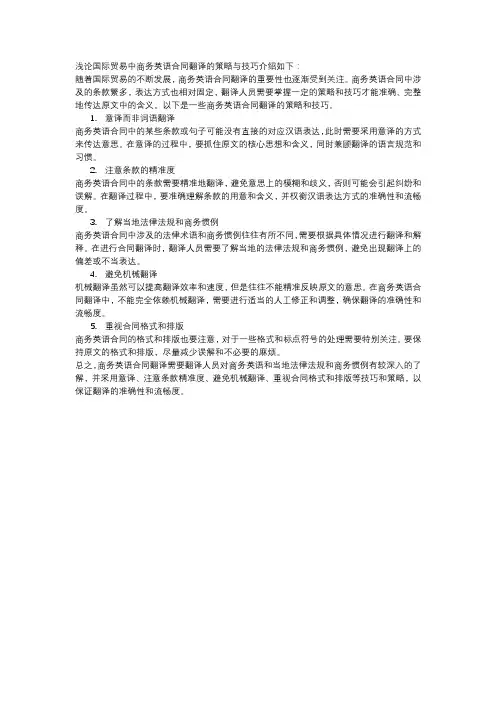
浅论国际贸易中商务英语合同翻译的策略与技巧介绍如下:
随着国际贸易的不断发展,商务英语合同翻译的重要性也逐渐受到关注。
商务英语合同中涉及的条款繁多,表达方式也相对固定,翻译人员需要掌握一定的策略和技巧才能准确、完整地传达原文中的含义。
以下是一些商务英语合同翻译的策略和技巧。
1.意译而非词语翻译
商务英语合同中的某些条款或句子可能没有直接的对应汉语表达,此时需要采用意译的方式来传达意思。
在意译的过程中,要抓住原文的核心思想和含义,同时兼顾翻译的语言规范和习惯。
2.注意条款的精准度
商务英语合同中的条款需要精准地翻译,避免意思上的模糊和歧义,否则可能会引起纠纷和误解。
在翻译过程中,要准确理解条款的用意和含义,并权衡汉语表达方式的准确性和流畅度。
3.了解当地法律法规和商务惯例
商务英语合同中涉及的法律术语和商务惯例往往有所不同,需要根据具体情况进行翻译和解释。
在进行合同翻译时,翻译人员需要了解当地的法律法规和商务惯例,避免出现翻译上的偏差或不当表达。
4.避免机械翻译
机械翻译虽然可以提高翻译效率和速度,但是往往不能精准反映原文的意思。
在商务英语合同翻译中,不能完全依赖机械翻译,需要进行适当的人工修正和调整,确保翻译的准确性和流畅度。
5.重视合同格式和排版
商务英语合同的格式和排版也要注意,对于一些格式和标点符号的处理需要特别关注。
要保持原文的格式和排版,尽量减少误解和不必要的麻烦。
总之,商务英语合同翻译需要翻译人员对商务英语和当地法律法规和商务惯例有较深入的了解,并采用意译、注意条款精准度、避免机械翻译、重视合同格式和排版等技巧和策略,以保证翻译的准确性和流畅度。
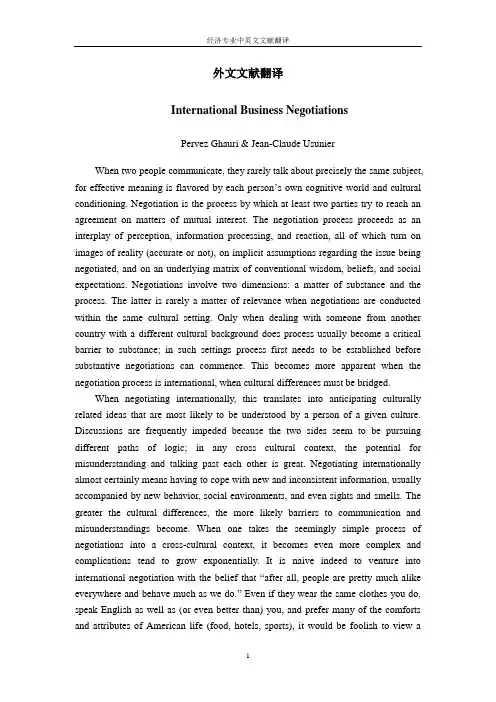
外文文献翻译International Business NegotiationsPervez Ghauri & Jean-Claude UsunierWhen two people communicate, they rarely talk about precisely the same subject, for effective meaning is flavored by each person’s own cognitive world and cultural conditioning. Negotiation is the process by which at least two parties try to reach an agreement on matters of mutual interest. The negotiation process proceeds as an interplay of perception, information processing, and reaction, all of which turn on images of reality (accurate or not), on implicit assumptions regarding the issue being negotiated, and on an underlying matrix of conventional wisdom, beliefs, and social expectations. Negotiations involve two dimensions: a matter of substance and the process. The latter is rarely a matter of relevance when negotiations are conducted within the same cultural setting. Only when dealing with someone from another country with a different cultural background does process usually become a critical barrier to substance; in such settings process first needs to be established before substantive negotiations can commence. This becomes more apparent when the negotiation process is international, when cultural differences must be bridged.When negotiating internationally, this translates into anticipating culturally related ideas that are most likely to be understood by a person of a given culture. Discussions are frequently impeded because the two sides seem to be pursuing different paths of logic; in any cross cultural context, the potential for misunderstanding and talking past each other is great. Negotiating internationally almost certainly means having to cope with new and inconsistent information, usually accompanied by new behavior, social environments, and even sights and smells. The greater the cultural differences, the more likely barriers to communication and misunderstandings become. When one takes the seemingly simple process of negotiations into a cross-cultural context, it becomes even more complex and complications tend to grow exponentially. It is naive indeed to venture into international negotiation with the belief that “after all, people are pretty much alike everywhere and behave much as we do.” Even if they wear the same clothes you do, speak English as well as (or even better than) you, and prefer many of the comforts and attributes of American life (food, hotels, sports), it would be foolish to view amember of another culture as a brother in spirit. That negotiation style you use so effectively at home can be ineffective and inappropriate when dealing with people from another cultural background; in fact its use can often result in more harm than gain. Heightened sensitivity, more attention to detail, and perhaps even changes in basic behavioral patterns are required when working in another culture.Members of one culture may focus on different aspects of an agreement (e.g., legal, financial) than may members of another culture (personal, relationships). The implementation of a business agreement may be stressed in one culture, while the range and prevention of practical problems may be emphasized in another culture. In some cultures, the attention of people is directed more toward the specific details of the agreement (documenting the agreement), while other cultures may focus on how the promises can be kept (process and implementation). Americans negotiate a contract; the Japanese negotiate a personal relationship. Culture forces people to view and value differently the many social interactions inherent in fashioning any agreement. Negotiations can easily break down because of a lack of understanding of the cultural component of the negotiation process. Negotiators who take the time to understand the approach that the other parties are likely to use and to adapt their own styles to that one are likely to be more effective negotiators.American and Russian people are not similar; their ethical attitudes do not coincide: they evaluate behavior differently. What an American may consider normative, positive behavior (negotiating and reaching a compromise with an enemy), a Russian perceives as showing cowardice, weakness, and unworthiness; the word “deal”has a strong negative connotation, even today in contemporary Russia. Similarly, for Russians, compromise has negative connotation; principles are supposed to be inviolable and compromise is a matter of integrity (The Russians are not alone here: a Mexican will not compromise as a matter of honor, dignity, and integrity; likewise, an Arab fears loss of manliness if he compromises.) A negotiation is treated as a whole without concessions. At the Strategic Arms Limitation Talks (SALT) talks, the Americans thought they had an agreement (meaning conclusive commitment), while the Russians said it was an understanding (meaning an expression of mutual viewpoint or attitude). When the Americans thought they had an understanding, the Russians said it was a procedural matter, meaning they had agreed to a process for conducting the negotiation. Different cultural systems can produce divergent negotiating styles--styles shaped by each nation’s culture, geography, history, and political system. Unless you see the world through the other’s eyes (nomatter how similar they appear to you), you may not be seeing or hearing the same. No one can usually avoid bringing along his or her own cultural assumptions, images, and prejudices or other attitudinal baggage into any negotiating situation. The way one succeeds in cross cultural negotiations is by fully understanding others, using that understanding to one’s own advantage to realize what each party wants from the negotiations, and to turn the negotiations into a win-win situation for both sides. A few potential problems often encountered during a cross-cultural negotiation include ( Frank, 1992):Insufficient understanding of different ways of thinking.Insufficient attention to the necessity to save face.Insufficient knowledge of the host country--including history, culture, government, status of business, image of foreigners.Insufficient recognition of political or other criteria.Insufficient recognition of the decision-making process.Insufficient understanding of the role of personal relations and personalities.Insufficient allocation of time for negotiations.Over two-thirds of U.S.-Japanese negotiation efforts fail even though both sides want to reach a successful business agreement (The U.S. Department of Commerce is even more pessimistic; it estimates that for every successful American negotiation with the Japanese, there are twenty-five failures.) In fact, these numbers hold true for most cross-cultural meetings. Often barriers to a successful agreement are of a cultural nature rather than of an economical or legal nature. Since each side perceives the other from its own ethnocentric background and experience, often neither side fully comprehends why the negotiations failed. It is precisely this lack of knowledge concerning the culture and the “alien” and “unnatural” expectations of the other side that hinders effective negotiation with those from another culture.In cross-cultural negotiations, many of the rules taught and used domestically may not apply--especially when they may not be culturally acceptable to the other party. For most Western negotiators this includes the concepts of give and take, of bargaining, and even of compromise. The stereotypical, common Western ideal of a persuasive communicator--highly skilled in debate, able to overcome objections with verbal flair, an energetic extrovert--may be regarded by members of other cultures as unnecessarily aggressive, superficial, insincere, even vulgar and repressive. To other Americans, the valued American traits of directness and frankness show evidence of good intentions and personal convictions. To an American it is complimentary to becalled straightforward and aggressive. This is not necessarily so, however, for members of other cultures. To describe a person as “aggressive”is a derogatory characterization to a British citizen. To the Japanese, those very same traits indicate lack of confidence in one’s convictions and insincerity. Instead, terms such as thoughtful, cooperative, considerate, and respectful instill positives in the Japanese and many Asian cultures.Domestically, the study of negotiation tends to encompass business relationships between parties, tactics, bargaining strategies, contingency positions, and so on. However, in a cross-cultural context, besides the usual rules of negotiation, one has to be wary of fine nuances in relationships and practices and how they are perceived and executed by members of the other culture. The two business negotiators are separated from each other not only by physical features, a totally different language, and business etiquette, but also by a different way to perceive the world, to define business goals, to express thinking and feeling, to show or hide motivation and interests. From the other party’s perspective, for example, to some cultures Americans may appear aggressive and rude, while to others, those very same Americans appear calm and uninterested.1 The Art of NegotiationsThe word “negotiations”stems from the Roman word negotiari meaning “to carry on business” and is derived from the Latin root words neg (not) and otium (ease or leisure). Obviously it was as true for the ancient Romans as it is for most businesspersons of today that negotiations and business involves hard work. A modern definition of negotiation is two or more parties with common (and conflicting) interests who enter into a process of interaction with the goal of reaching an agreement (preferably of mutual benefit). John Kenneth Galbraith said “Sex apart, negotiation is the most common and problematic involvement of one person with another, and the two activities are not unrelated.” Negotiations are a decision-making process that provides opportunities for the parties to exchange commitments or promises through which they will resolve their disagreements and reach a settlement.A negotiation is two or more parties striving to agree when their objectives do not coincide.Negotiation consists of two distinct processes: creating value and claiming value. Creating value is a cooperative process whereby the parties in the negotiation seek to realize the full potential benefit of the relationship. Claiming value is essentially a competitive process. The key to creating value is finding interests that the parties havein common or that complement each other, then reconciling and expanding upon these interests to create a win-win situation. Parties at the negotiating table are interdependent. Their goals are locked together. A seller cannot exist without a buyer. The purpose of a negotiation is a joint decision-making process through which the parties create a mutually acceptable settlement. The objective is to pursue a win-win situation for both parties.Negotiations take place within the context of the four Cs: common interest, conflicting interests, compromise, and criteria (Moran and Stripp, 1991). Common interest considers the fact that each party in the negotiation shares, has, or wants something that the other party has or does. Without a common goal, there would be no need for negotiation. Conflict occurs when people have separate but conflicting interests. Areas of conflicting interests could include payment, distribution, profits, contractual responsibilities, and quality. Compromise involves resolving areas of disagreement. Although a win-win negotiated settlement would be best for both parties, the compromises that are negotiated may not produce the result. The criteria include the conditions under which the negotiations take place. The negotiation process has few rules of procedure. Rules of procedure are as much a product of negotiation as the issues. Over time, the four Cs change and the information, know-how, and alternatives available to the negotiating international company and the host country also change, resulting in a fresh interpretation of the four Cs, the environment, and the perspective. In essence, negotiation takes place within the context of the political, economic, social, and cultural systems of a country. The theory of the negotiation process includes the following dimensions: (1) bargainer characteristics, (2) situational constraints, (3) the process of bargaining, and (4) negotiation outcomes. This theory is based on actors who share certain values and beliefs based on their culture. These actors function in business and economic situations that also have cultural influences, and they act in certain culturally inscribed ways. We bargain when:1. A conflict of interest exists between two or more parties; that is, what is, whatone wants is not necessarily what the other one wants.2. A fixed or set of rules or procedures for resolving the conflict does not exist,or the parties prefer to work outside of a set of rules to invent their own solution to the conflict.3. The parties, at least for the moment, prefer to search for agreement rather thanto fight openly, to have one side capitulate, to permanently break off contact, or to take their dispute to a higher authority to resolve it.In summary, negotiations primarily consists of five aspects: (1) goals: motivating the parties to enter; (2) the process of negotiating that involves communications and actions; (3) outcomes; (4) preexisting background factors of cultural traditions and relations; and (5) specific situational conditions under which the negotiation is conducted.2 VerbalLanguage is highly important. When people from different cultures communicate, culture-specific factors affect how they encode and decode their messages. Negotiators should check understanding periodically, move slowly, use questions liberally, and avoid slang and idioms. Even the discussion of negotiation, compromise, and agreement has different meanings to different cultures. Both the American and Korean meanings for the word “corruption”are negative; however in the United States, the word connotes being morally wrong while for the Koreans it implies being socially unfortunate. The Mexican will not compromise as a matter of honor, dignity, and integrity. The Arab fears loss of manliness if he compromises. In Russia, compromise has a negative connotation; principles are supposed to be inviolable and compromise is a matter of integrity. For Russians, a negotiation is treated as a whole without concessions.In the American culture, those who refuse to bargain are viewed as cold, secretive, and not really serious about conducting business. The Dutch are not hagglers; you should make your offer fairly close to your true asking price; if you start making large concessions you will lose their confidence. The Swedes are methodical, detailed individuals who are slow to change positions. Bargaining is not highly valued in Swedish culture; those who bargain, who attempt to negotiate by offering a higher price in order to concede to a lower price, can be viewed as untrustworthy, inefficient, or perhaps out for personal gain at the expense of others.3 Nonverbal Communications in Cross-Cultural NegotiationsNonverbal behavior may be defined as any behavior, intentional or unintentional, beyond the words themselves that can be interpreted by a receiver as having meaning. Nonverbal behaviors could include facial expressions, eye contact, gestures, body movements, posture, physical appearance, space, touch, and time usage. They are all different from culture to culture. Nonverbal behaviors either accompany verbalmessages or are used independently of verbal messages. They may affirm and emphasize or negate and even contradict spoken messages. Nonverbal behaviors are more likely to be used unconsciously and spontaneously because they are habitual and routine behaviors.The wide range of behaviors called nonverbal behavior can be divided into seven categories. Gestures, body movement, facial movement, and eye contact are combined in the kinesic code commonly called body language. Vocalics refers to call vocal activity other than the verbal context itself. Also called paralanguage, vocalics includes tone, volume, and sounds that are not words. Behaviors that involve touching are placed in the haptics code. The use of space is called proxemics, and the use of time is chronemics. Physical appearance includes body shape and size, as well as clothing and jewelry. Finally, artifacts refer to objects that are associated with a person, such as one’s desk, car, or books. It should be emphasized that these codes do not usually function independently or sequentially; rather, they work simultaneously. In addition, nonverbal behavior is always sending messages; we can not communicate without using them, although, at times, the messages may be ambiguous. This wide range of nonverbal behaviors serves various functions in all face-to-face encounters. Most important, emotional messages at the negotiating table are expressed nonverbally by gestures, tone of voice, or facial expressions. The other side’s interpretation of your statement depends on the nonverbal more than what was actually said. Nonverbal communications is significant.From: International Business Negotiations, 2001国际商务谈判伯维茨.高利, 简.科劳德.阿斯尼尔当两个人交流时,他们很少精确地谈论相同的问题,因为实际的意思会受到每个人认知的世界和文化熏陶的影响。
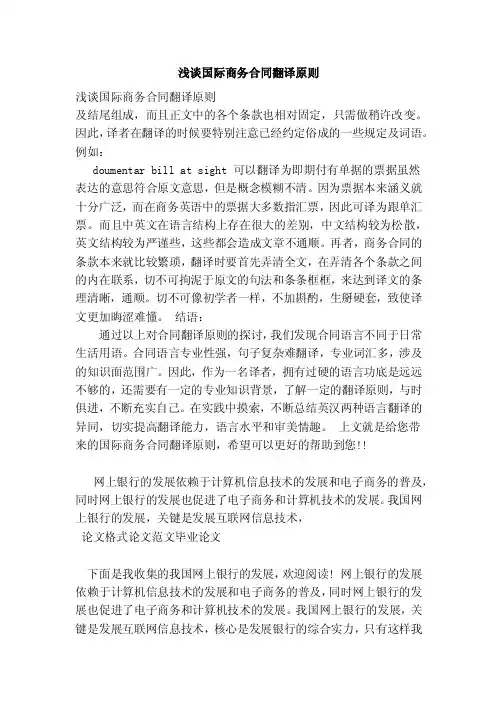
浅谈国际商务合同翻译原则浅谈国际商务合同翻译原则及结尾组成,而且正文中的各个条款也相对固定,只需做稍许改变。
因此,译者在翻译的时候要特别注意已经约定俗成的一些规定及词语。
例如:doumentar bill at sight 可以翻译为即期付有单据的票据虽然表达的意思符合原文意思,但是概念模糊不清。
因为票据本来涵义就十分广泛,而在商务英语中的票据大多数指汇票,因此可译为跟单汇票。
而且中英文在语言结构上存在很大的差别,中文结构较为松散,英文结构较为严谨些,这些都会造成文章不通顺。
再者,商务合同的条款本来就比较繁琐,翻译时要首先弄清全文,在弄清各个条款之间的内在联系,切不可拘泥于原文的句法和条条框框,来达到译文的条理清晰,通顺。
切不可像初学者一样,不加斟酌,生掰硬套,致使译文更加晦涩难懂。
结语:通过以上对合同翻译原则的探讨,我们发现合同语言不同于日常生活用语。
合同语言专业性强,句子复杂难翻译,专业词汇多,涉及的知识面范围广。
因此,作为一名译者,拥有过硬的语言功底是远远不够的,还需要有一定的专业知识背景,了解一定的翻译原则,与时俱进,不断充实自己。
在实践中摸索,不断总结英汉两种语言翻译的异同,切实提高翻译能力,语言水平和审美情趣。
上文就是给您带来的国际商务合同翻译原则,希望可以更好的帮助到您!!网上银行的发展依赖于计算机信息技术的发展和电子商务的普及,同时网上银行的发展也促进了电子商务和计算机技术的发展。
我国网上银行的发展,关键是发展互联网信息技术,论文格式论文范文毕业论文下面是我收集的我国网上银行的发展,欢迎阅读! 网上银行的发展依赖于计算机信息技术的发展和电子商务的普及,同时网上银行的发展也促进了电子商务和计算机技术的发展。
我国网上银行的发展,关键是发展互联网信息技术,核心是发展银行的综合实力,只有这样我国的银行业才能适应全球化的浪潮。
只有我国银行业解决好互联网金融赖以发展的互联网科技问题,并通过学习和借鉴外国的先进经验,不断整合不断创新,研究出具有中国特色的互联网金融产品,才有可能在日趋激烈的网银市场竞争中取得优势地位,从而在经济及金融全球化的浪潮中建立起具有中国特色的网上银行品牌。
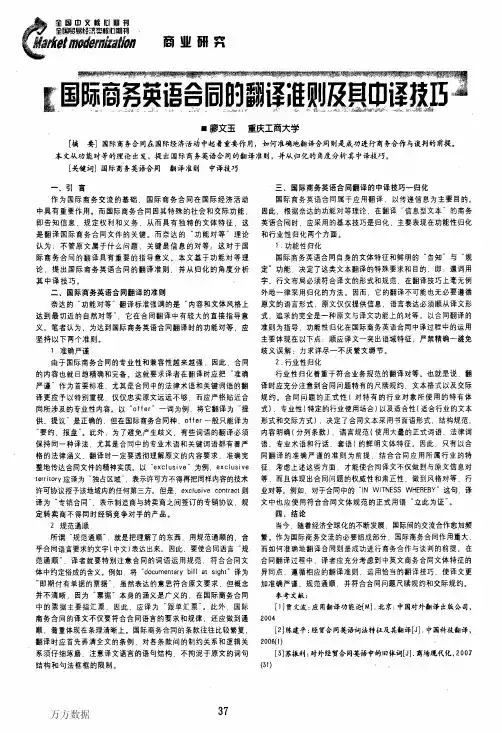
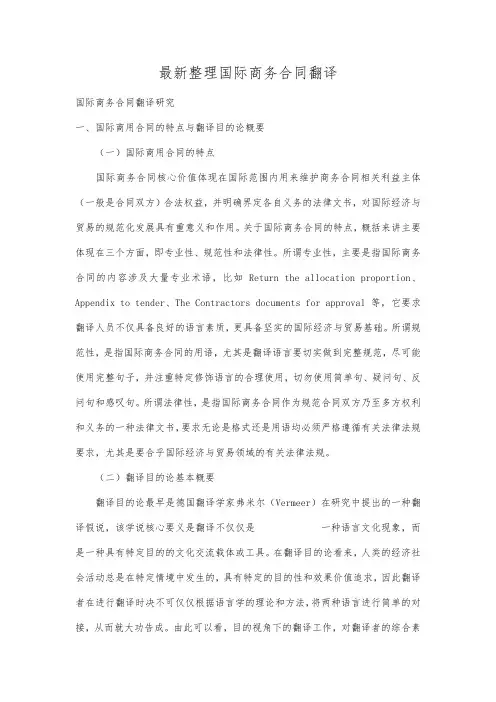
最新整理国际商务合同翻译国际商务合同翻译研究一、国际商用合同的特点与翻译目的论概要(一)国际商用合同的特点国际商务合同核心价值体现在国际范围内用来维护商务合同相关利益主体(一般是合同双方)合法权益,并明确界定各自义务的法律文书,对国际经济与贸易的规范化发展具有重意义和作用。
关于国际商务合同的特点,概括来讲主要体现在三个方面,即专业性、规范性和法律性。
所谓专业性,主要是指国际商务合同的内容涉及大量专业术语,比如Return the allocation proportion、Appendix to tender、The Contractors documents for approval等,它要求翻译人员不仅具备良好的语言素质,更具备坚实的国际经济与贸易基础。
所谓规范性,是指国际商务合同的用语,尤其是翻译语言要切实做到完整规范,尽可能使用完整句子,并注重特定修饰语言的合理使用,切勿使用简单句、疑问句、反问句和感叹句。
所谓法律性,是指国际商务合同作为规范合同双方乃至多方权利和义务的一种法律文书,要求无论是格式还是用语均必须严格遵循有关法律法规要求,尤其是要合乎国际经济与贸易领域的有关法律法规。
(二)翻译目的论基本概要翻译目的论最早是德国翻译学家弗米尔(Vermeer)在研究中提出的一种翻译假说,该学说核心要义是翻译不仅仅是一种语言文化现象,而是一种具有特定目的的文化交流载体或工具。
在翻译目的论看来,人类的经济社会活动总是在特定情境中发生的,具有特定的目的性和效果价值追求,因此翻译者在进行翻译时决不可仅仅根据语言学的理论和方法,将两种语言进行简单的对接,从而就大功告成。
由此可以看,目的视角下的翻译工作,对翻译者的综合素质提出了更高的要求,它不仅要求翻译者具有特定的语言学功底,更要深刻领会翻译对象的中心思想和目的追求,重在突出翻译过程的目的性以及翻译内容的功能性,要求翻译人员不仅要对翻译内容进行精准把握,更要从深层次把握翻译的目的和价值追求,在此基础上合理选择翻译方法与翻译策略。


自改革开放以来,我国对外经济交往日益频繁。
在对外经济活动中,所有国际商务活动的进行都需要签订合同和书写法律文书。
尤其在中国加入世贸组织之后,随着经济的发展和信息全球化,跨国商务交往更加频繁,这就促进了对商务合同进行翻译的需求。
但由于专业背景的欠缺和英汉文化差异的存在,目前不少商务合同的翻译存在许多问题,有时可能会错误百出。
而这些不符合规范的商务合同的翻译不但会引发法律纠纷,造成巨大的经济损失甚至还可能扰乱国际市场秩序,由此可以看出商务合同的翻译需要有具体的基本原则和翻译策略的指导。
有鉴于此,本文作者着手试析英文商务合同翻译的基本原则和策略。
本文第一部分介绍了商务英文合同翻译的现状及存在的问题。
第二部分针对英文商务合同翻译的“忠实原文、用词准确”、“译文完整、文体规范”、“达意通顺、条理清晰”等方面来阐述英文商务合同的翻译原则。
第三部分是对英文商务合同翻译的技巧进行了列举,如了解汉语的表达习惯、熟悉与商务英语相关的专业知识、使用专业术语翻译。
第四部分为本论文的结论部分,英文商务合同的翻译策略,并不是一成不变的,应该学会变通和灵活运用各种翻译技巧,不同的场合和语境中根据翻译的基本原则采用不同的翻译策略,无论怎样,英文商务合同的翻译首先要忠实于原文,然后要正确把握合同中的词义,注意翻译中的措辞以免引起歧义使整个译文融于一体。
关键词:英文商务合同;翻译原则;翻译技巧前言一、英文商务合同翻译的现状及存在的问题 (1)(一)英文商务合同翻译的现状 (1)(二)英文商务合同翻译中存在的问题 (1)二、英文商务合同翻译的基本原则 (2)(一)忠实原文、用词准确 (2)(二)译文完整、文体规范 (2)(三)达意通顺、条理清晰 (3)三、英文商务合同的翻译技巧 (3)(一)了解汉语的表达习惯 (3)(二)熟悉与商务英语相关的专业知识 (3)(三)使用专业术语翻译 (4)(四)了解商务合同的语言特点 (4)(五)分清该商务合同的种类 (4)(六)用规范化的书面语言进行翻译 (4)(七)确保内容完善 (5)(八)用词精练 (5)结论 (5)参考文献 (6)致谢 (7)浅谈英文商务合同的翻译原则和策略随着经济的发展,改革开放后的中国日益融入于全球这个大家庭中,国际经济贸易活动日益频繁,而在对外贸易中英语作为一种必不可少的交际工具,这就使英语成为了贸易双方交往的一种媒介。

浅论国际贸易中商务英语合同翻译的策略与技巧一、本文概述在全球化日益深入的今天,国际贸易活动日益频繁,商务英语合同作为跨国交易中不可或缺的一环,其重要性不言而喻。
商务英语合同不仅详细规定了交易双方的权利与义务,还为可能出现的争议提供了法律依据。
因此,商务英语合同的翻译工作在国际贸易中扮演着举足轻重的角色。
本文旨在探讨国际贸易中商务英语合同翻译的策略与技巧,以期提高翻译质量,促进国际贸易的顺利进行。
我们将对商务英语合同的特点和翻译要求进行深入分析,明确翻译过程中应遵循的原则。
接着,我们将结合具体案例,探讨商务英语合同翻译中常用的策略与技巧,如直译与意译的灵活运用、词汇的精确选择、句子结构的调整等。
本文还将对商务英语合同翻译中可能遇到的难点和挑战进行分析,并提出相应的解决方案。
通过本文的研究,我们希望能为从事商务英语合同翻译工作的专业人员提供有益的参考和启示,推动国际贸易的健康发展。
二、商务英语合同的语言特点商务英语合同是一种具有法律效力和商业约束力的正式文件,因此在语言上呈现出一些独特的特点。
商务英语合同的语言必须准确无误,避免使用模棱两可或含糊不清的表达方式。
合同中的每一个词汇、每一个短语都需要精确无误地传达其原始含义,以避免误解和争议。
商务英语合同的语言通常采用正式、专业的术语。
这是因为合同涉及的法律和商业概念往往比较复杂,需要使用专业术语来准确表达。
同时,正式的语言风格也增强了合同的权威性和严肃性。
商务英语合同的语言还注重客观性和中立性。
合同文本不应包含任何主观情感或个人立场,而应保持客观、中立的描述。
这有助于确保合同内容的公正性和公平性,避免任何一方在理解合同内容时产生偏见或误解。
商务英语合同的语言还需要考虑其法律效应。
合同中的语言应当符合相关法律的规定,确保合同的合法性和有效性。
合同中的语言还应当注意避免产生任何潜在的法律风险,如使用过于模糊或不确定的措辞。
商务英语合同的语言特点主要体现在准确性、专业性、客观性、中立性和法律效应上。

毕业论文:从目的论角度分析国际商务英语翻译策略摘要:在国际商务合同的翻译过程中,以目的原则作为指导准则,一方面基于忠实原则,力求做到译本准确严谨,另一方面基于连贯原则,力求做到译本规范通顺,有利于实现译文在目标语文化中的预期功能,具备与原文同等的法律效力。
本文是对个案的翻译实践进行的分析,且仅限于单一类型的合同文本(合伙协议),提取的实例数量有限,研究具有局限性,需结合多个文本,多角度、多层次进行。
一理论概述20世纪70年代,hansvermeer提出了目的论,认为翻译是以原文为基础的有目的和有结果的行为。
”任何翻译行为都是由翻译的目的决定的,简而言之,就是‘翻译的目的决定翻译的手段’”[5]。
学界普遍认为运用目的论来指导应用文体翻译实践有着重要的现实意义和理论价值,因为“它(目的论)不仅可以在宏观策略上为应用翻译指明方向,还可为译者顺利实施不同文本的翻译策略提供可行性途径”[6]53,“与应用类语篇的翻译实践有更密切的关系,具有更直接的指导作用”[7]。
二、研究个案的背景作为法律英语翻译,国际商务合同的原文和译文都属于“契约文体”[8],具备法律效力,规范和约束着合同各方的权利和义务。
研究个案为中国医药城在20xx年第二届中国(泰州)国际医药博览会期间与美国某研究院签订的战略合作合同,属于合伙协议(partnershipagreement),是合同当事人各方就医药产业领域展开合作所发生的权利和义务关系而达成的书面协议。
源语文本由美国某研究院提供,笔者受中国医药城委托对此文本进行翻译。
经中国医药城同意后,将该联盟合同(源语文本和译语文本)用于个人翻译实践的研究,对涉及保密信息的相关内容进行了技术处理。
该合同格式规范,内容完整,条款清晰,语言严谨,体现了法律语言的文体特征,具有可研究性。
三、目的论及其三个基本原则的应用宏观层面上,依据目的论的目的原则,分析国际商务合同翻译要求的要素,如原作者的意图、翻译过程的发起者、译文接收者、译者以及预期文本功能等,明确翻译目的,使译文要达到预期文本功能,尽可能地实现与源语文本相同法律效力。

浅谈国际商务合同翻译原则浅谈国际商务合同翻译原则 下面是小编收集的国际商务合同翻译原则,欢迎阅读! Abstract:Since the reform and opening up ,we have more and more international economic and trade activities ,thus we need to sign and write more and more legal documents .Business contracts are very important as a media .Business contracts are legal documents and are binding on both sides. Small errors in contract will caused huge losses .This paper lists a lot of examples to analysis the principle of the international business contract translation ,hoping to be of help. Keyword:International ; Business contract ; The principle of translation 前言 21世纪是一个催人奋进的时代,科技革命迅猛发展,知识更替日新月异,国际竞争力日趋激烈。
中国加入世贸组织以来,与它国经济交流越来越多,经济发展日益国际化。
与国内经济不同,国际经贸活动要涉及两个或两个以上国家或地区的当事人,因此需要一个媒介来促使双方达成共识.国际商务合同作为媒介的作用突现出来。
合同,也叫契约,契意思相投或相合,约是用语言文字互相遵守约定,合同是指自愿订立共同遵守的条件,合作共事。
《中华人民共和国》第二条规定合同是平等主体的自然人,法人,其他组织之间设立,变更,终止民事权利义务关系的协议〔contracts referred to in this law are agreements between equal natural persons,legal persons and other organizations for the purpose of establishing,altering and terminating mutual civil rights and obligations〕。

浅谈商务合同翻译作者:郑霄雁宋颖洁来源:《商场现代化》2007年第32期[摘要] 国际商贸合同是进行对外经贸活动的必经环节,其中的商务合同中英文译本起到了关键的作用。
本文从商务合同的文本特征出发,对商务合同的翻译程序和翻译准则进行了论述,旨在探讨如何进一步提高商务合同的翻译质量。
[关键词] 商务合同文本特征翻译程序翻译准则随着世界经济贸易往来日益频繁,我国经济正朝着多元化的方向发展,各种形式的涉外经济活动与日俱增,加入WTO更意味着我国经济发展在各方面都面临着一场全新的、彻底的革命。
随着与外商合作的机会越来越多,起草、谈判、签订各种国际商贸合同成为必经环节,国际商贸合同种类繁多,常见的有劳动就业合同、工程建筑合同、技术服务合同、投招标合同、信贷合同、租赁合同、外贸合同、购销合同、保险合同等。
其中,商务合同占据了很大的比例.商务合同是当事人双方所凭借的用来维护自身权益的法定文本,因此商务活动也对商务合同文本的翻译质量提出了很高的要求。
一、商务合同文本特征概述商务合同的文本特征可以总括为如下三方面:条理性、规范性和专业性。
其一,条理性。
合同文体的基本体式即为纲目、条款和细则,因此条理性是译文的重要基本特征之一。
条理性主要体现在语言体式上,为了求得行文和语言上的条分缕析、条理清晰,商务合同的条款在句式结构上往往大同小异,目地就是为了保持其结构上的一致性。
其二,规范性。
由于商务合同是双方维护自己权益的法定书面依据,因此它的措辞都要求运用庄严体语言或正式文体。
只有经双方同意后,才能对语言文字进行变动或修饰,不允许文字上的随意性。
其三,专业性。
商务合同的专业性极强,涉及到金融、商贸、关税、海关、商品、保险、仓储、物流、商品检验、法律等多项领域,一个商业合同即为多种领域专业知识的复合文本。
因此,翻译的过程就是一个不断吸纳、整合新知识的过程。
商务合同文本特征的这些基本特点就决定了商务翻译过程要遵循严格的程序进行。
商务合同翻译的意义和价值论文商务合同翻译的意义和价值随着国际经济交流的不断深入,商务活动已经成为各国经济发展的主要推动力之一。
在国际商务活动中,涉及到各种合同,而商务合同翻译作为承接国际商务和跨文化交流的桥梁,其意义和价值不容忽视。
一、双方的基本信息商务合同翻译首先需要明确双方的基本信息,包括公司名称、地址、联系电话、电子邮箱、法定代表人等。
这些基本信息是商务合作的基础,也是保证合同执行的法律基础,因此必须妥善处理。
二、各方身份、权利、义务、履行方式、期限、违约责任商务合同翻译其次需要明确各方的身份、权利、义务、履行方式、期限、违约责任等内容。
合同的签订是各方达成一致的结果,而明确各方的身份和权利义务可以保证合同的执行。
同时,明确履行方式、期限和违约责任也可预防争议和纠纷,提升商业合作的稳定性和可靠性。
三、需遵守中国的相关法律法规商务合同翻译还需要明确合同所涉及的相关法律法规。
中国是一个法治国家,因此商务合同必须遵守中国的法律法规,否则合同就会失去法律效力,无法维护各方的利益。
四、明确各方的权力和义务商务合同翻译需要明确各方的权力和义务,包括产品和服务质量、价格、付款方式、交付期限等内容。
明确各方的权力和义务可以确保合同的公平性和合理性,有利于商业关系的发展和经济利益的最大化。
五、明确法律效力和可执行性商务合同翻译需要明确法律效力和可执行性。
合同的法律效力和可执行性是商务合作的基石,也是普遍认可的国际商务规则。
在合同翻译过程中,我们需要确保合同的法律效力和可执行性达到国际标准,为商务活动提供保障。
商务合同翻译的意义和价值在于,可以通过将不同语言的商务合同转化为目标语言,实现跨文化和跨国交流,促进国际商业合作和贸易的发展。
同时,商务合同翻译也可以确保合同的法律效力和可执行性,为商业关系提供一定的保障。
总之,在国际商务活动中,商务合同翻译的意义和价值不断凸显,合法、准确、明确、公平、有效的翻译服务将会在跨文化交流中起到越来越重要的作用。
浅谈国际商务合同的翻译(商务英语毕业论文)中文摘要在国际经济贸易活动中,商务合同是一种重要的法律文件依据,商贸英语已成为必不可少的语言交际工具,它也是英文经济贸易合同的基点。
越来越多的英语和法律的爱好者也希望能尽快熟悉合同英语,从而准确理解,翻译、制作英语合同.这种需求随着中国加入WTO(世界贸易组织)而剧增,用英语解决商务合同问题的愿望也会随之越来越迫切。
国际商务合同的种类繁多,涉及面广,内容复杂.这类合同都是涉外交易性质,需要英汉两种版本,因此大多需要翻译。
商务合同有其自身的特点,即条理性、规范性和专业性.商务合同对翻译的质量提出很高的要求,也增加了其难度.本文用大量的例句,对商务合同英语的准确性、严谨性、规范性及翻译技巧与内容的完善还有翻译中常见错误、成因及其对策等作了全面分析和论述,并分析其翻译方面所应注意的问题.关键词:国际商务合同;翻译;原则;准确性;严谨性;规范性一、前言在世界经济阔步迈向21 世纪的今天,国际经济贸易活动日益频繁,改革的中国正积极投身于国际经济贸易活动中。
在这一全球贸易过程中商贸英语已成为必不可少的语言交际工具,它也是英文经济贸易合同的基点.在当今社会经济生活中,公民、法人和其他组织有时候会直接遇到等待签署的英语合同。
对律师、法律顾问等法律专业人士来说,实际工作中会遇到需要审查和修改的英语合同,有时候会遇到要求其拿出中文合同的英文翻译稿,甚至要求直接用英语草拟英文合同的情形。
越来越多的英语和法律的爱好者也希望能尽快熟悉合同的英语,准确理解,翻译、制作英语合同的真功夫。
这种需求随着中国加入WTO(世界贸易组织)而剧增,用英语解决商务合同问题的愿望也会随之越来越迫切。
合同,也叫契约.“契",即意思相投或相合,“约”是用语言或文字互定共守的条件。
合同的意思是愿意订立共同遵守的条件、合作共事。
《中华人民共和国民法通则》第85条规定:“合同是当事人之间设立、变更、终止民事权利义务关系的协议”(A contract shall be an agreement whereby the parties establish,change,terminate their civil relationship)。
国际商务合同论文国际商务合同是一个有目的、有步骤的纲要式语篇体裁,其语域特征决定其属于庄严正式文体。
下文是店铺为大家搜集整理的关于国际商务合同论文的内容,欢迎大家阅读参考!国际商务合同论文篇1浅论国际商务合同的语言特点和翻译策略摘要:商务合同具有特殊的语言特征,本文对如何提高商务合同翻译准确性的策略,从语法规则、具体语境、文化差异等角度进行了分析和讨论。
关键词:商务合同准确性翻译策略一、引言对国际商务合同翻译来说,准确性是一项基本且极为重要的要求。
国际商务合同是一种法律文件,对贸易双方的权利和义务进行了清晰明确的规定。
如果不能准确翻译这些具有法律效力的规范性条款,造成各方对合同的理解存在偏差,则不可避免产生合同纠纷,影响双方对合同的正常履行。
因此,了解商务合同的语言特点及其翻译策略是极其重要的。
二、商务合同的语言特点(一)使用正式用语商务合同的庄重文体风格,首先体现在其措辞的正式性,因此合同的语言通常避免使用俚语、口语等非正式表达,而用正式程度较高的词取代正式程度较低的词,以便达到表述更加正式的效果。
比如:Either party reserves the right to terminate this agreement upon negotiation.这句话当中用书面用语“terminate”来取代较口语化的“end”,大大增强了正式性。
类似的例子还有purchase(buy),party(side), reserve(keep),render (make), residence (home) ,state( say) , inform( tell) , deem(think),等等。
(二)使用古体词和外来词为了体现庄重严肃的文体风格,商务合同中经常使用古体词,这些词主要来源于古英语,其中由一些复合副词构成的古体词最为常见,比如hereafter(此后,今后),hereby(特此,兹),herein(此中,于此,本合同中),thereafter(此后,后来),thereby (因此,由此,在那方面),therefrom(由此、从此),whereas(鉴于),whereby(因此,由是,据此),wherefore(为此,因此)等。
- 246 -校园英语 /浅析商务英语合同翻译湖南商学院外国语学院/邹尚非【摘要】商务合同是规定合同当事人权利和义务的具有法律效力的正式文件,对合同文本翻译质量有着很高的要求。
该文基于商务英语合同的词法和句法特点,分析了英语商务合同翻译的原则和方法,旨在提高翻译的准确性,保证交易双方的利益。
【关键词】英语商务合同 翻译原则一、前言随着国际间的商务往来日益频繁和广泛,商务合同在国际交流中所起的作用也变得越来越重要,此外由于贸易有关方涉及不同的国家,起草与翻译国际商务合同就成为商务领域中的一项重要工作。
二、英语商务合同的语言特征1.词汇层。
词汇是语言的建筑材料,而单词是构成语言的最基本的独立运用单位,所以正确理解和选择词汇是保证商务合同英语翻译质量的首要条件。
商务合同有很强的法律兼容性。
因而要求词汇专业性、正式、严谨、准确且简洁、明了。
(1)专业词汇。
商务合同种类繁多,包括货物销售合同、加工装配合同、技术转让合同等,涉及贸易、技术、法律、农业等学科。
而专业术语是用来确切表达科学概念的词,具有丰富的内涵和外延。
它们要求单义性,排斥多义性和歧义性,且都是固定的,不得随意更改。
例如“collection ”、“confirm ”、“accept ”、“tolerance ”和“more or less ”在普通英语中通常被译为“收集”、“确认”、“接受”、“承受”和“大约”,而在合同中,这些词则是商务术语,分别是“托收”、“保兑”、“承兑”、“公差”和“溢短装”的意思。
(2)古体词汇。
频繁使用古语词是商务合同的又一特征。
古语词虽然看起来有些过时,但却增加了合同语言的正式性和严肃性。
这些词通常由“here ,there ,where ”等副词和“in ,of ,under ,by ,after ,with ,”等小品词组合而成。
如:hereinafter 的意思是“在接下来的合同里”,而在汉语合同中,“下列”就是这一意思的最好体现。
中文摘要在国际经济贸易活动中,商务合同是一种重要的法律文件依据,商贸英语已成为必不可少的语言交际工具,它也是英文经济贸易合同的基点。
越来越多的英语和法律的爱好者也希望能尽快熟悉合同英语,从而准确理解,翻译、制作英语合同。
这种需求随着中国加入WTO (世界贸易组织)而剧增,用英语解决商务合同问题的愿望也会随之越来越迫切。
国际商务合同的种类繁多,涉及面广,内容复杂。
这类合同都是涉外交易性质,需要英汉两种版本,因此大多需要翻译。
商务合同有其自身的特点,即条理性、规范性和专业性。
商务合同对翻译的质量提出很高的要求,也增加了其难度。
本文用大量的例句,对商务合同英语的准确性、严谨性、规范性及翻译技巧与内容的完善还有翻译中常见错误、成因及其对策等作了全面分析和论述,并分析其翻译方面所应注意的问题。
关键词:国际商务合同;翻译;原则;准确性;严谨性;规范性ON THE TRANSLATION OF INTERNATIONAL BUSINESS CONTRACTSAbstractIn the activities of international business trade, business contract has become an important legal document. Nowadays, business English has become not only a necessary tool for communication, but also the base of English business contracts. More and more English-learners and law-majors hope they can know something about English business contracts so as to understand them correctly, translate them exactly and make them perfectly. China’s entering the WTO enhances their desire to use English to solve the problems of business contracts. There are many different kinds of international business contracts, whose contents are diversified and complicated. In international trade, translation is compulsory since contracts usually need two versions: English and Chinese. The international business contract has its own characters, such as proper arrangement, standardization and specialty. All these make the translation of them very difficult and thus demand good skills to ensure a high quality. This article analyzes the preciseness, strictness and standardization of business contracts and explores the skills of translating them by citing many examples. It also points out some common translation errors, the reasons and the methods to correct the errors. Finally some advice is given to call readers attention to the problems in translation.Key words: international business contract; translation; principle; preciseness; strictness; standardization一、前言在世界经济阔步迈向21 世纪的今天,国际经济贸易活动日益频繁,改革的中国正积极投身于国际经济贸易活动中。
在这一全球贸易过程中商贸英语已成为必不可少的语言交际工具,它也是英文经济贸易合同的基点。
在当今社会经济生活中,公民、法人和其他组织有时候会直接遇到等待签署的英语合同。
对律师、法律顾问等法律专业人士来说,实际工作中会遇到需要审查和修改的英语合同,有时候会遇到要求其拿出中文合同的英文翻译稿,甚至要求直接用英语草拟英文合同的情形。
越来越多的英语和法律的爱好者也希望能尽快熟悉合同的英语,准确理解,翻译、制作英语合同的真功夫。
这种需求随着中国加入WTO(世界贸易组织)而剧增,用英语解决商务合同问题的愿望也会随之越来越迫切。
合同,也叫契约。
“契”,即意思相投或相合,“约”是用语言或文字互定共守的条件。
合同的意思是愿意订立共同遵守的条件、合作共事。
《中华人民共和国民法通则》第85条规定:“合同是当事人之间设立、变更、终止民事权利义务关系的协议”(A contract shall be an agreement whereby the parties establish,change,terminate their civil relationship)。
而国际商务合同作为其中的一种,从一般意义上讲,是指具有某种涉及两国或两国以上业务的合同。
对一国而言,国际商务合同也称为涉外合同。
国际商务合同的种类繁多,涉及面广,内容复杂。
我国的国际商务合同的种类,根据贸易方式的性质和内容的不同主要做如下分类:“1.销售或购货合同;2.技术转让合同;3.合资或合营合同;4.补偿贸易合同;5.国际工程承包合同;6.代理协议;7.来料加工合同;8.多种贸易方式相结合的合同;9.涉外信贷合同;10.国际BOT投资合同;11.国际租赁合同。
”[1](P14) “合同类文件是具有法律性质的文件,主要包括合同,契约,协议和意向等,它是双方当事人或单位就某一经济或商业活动经过协商达成的协议,对双方具有约束力,因此也被人称为“契约文体”,这种协议是可以很正规的,也可以是非正式的。
”[2](P53)此类合同都是涉外交易性质,需要英汉两种版本,因此大多需要翻译。
随着我国市场经济的不断发展和改革开放的不断深入,市场竞争机制得到进一步完善,对外经济贸易往来日益频繁,企业涉外经营的规模逐步扩大,与外商合作的机会越来越多,起草、谈判、签订商务合同成为必不可少的环节。
“商务合同business contract)是自然人或法人之间为实现一定的商务目的,按一定的合法手续达成的规定相互权利和义务的契约,它对签约各方都具有法律约束力。
”[3](P84)正因为合同具有法律效用,合同双方都必须严格按照合同的约定,全面履行自己的义务,这就需要合同的文字斟词酌句,力求准确无误。
二、商务合同的翻译(商务英语毕业论文)(一)、翻译的原则与要点商务合同是一种特殊的应用文体,重在记实,用词行文的一大特点就是准确与严谨。
由于商务合同又是具备法律效应的文件,它要严格规定合同双方的义务、权力、行为准则等明确条款,所以“丝毫不能允许语义的模棱两可而使人误解,被人钻了法律的空子,它宁可牺牲文字流畅也要保持文意斩钉截铁的确凿性”。
“首先要注意公文的格式,原则上原文的体例应当保留,因为这些格式是一种语体(语域) 标识,自有其形式意义。
此外,要正确把握词义,尤其要认清一些common words 在公文中的特定含义。
在措辞上,还要注意词语的正式程度及专业术语和公文习用语的使用。
” [4](P53)而刘法公也强调:商贸翻译应遵循“忠实、准确、统一” [5] (P45)的原则,即表达要忠实原文,用词要准确,整个译文要融为一体。
因此,商务合同的翻译原则应遵守把忠实原义放在首位; 译文应符合目标语体裁和格式;选词应准确无误,以免误解,产生歧义;注意专业术语和公文语言的惯用法;还有在翻译方法上,主要采取直译加调整的方法。
只有基于以上这些原则才能出色地完成工作,更好地服务于社会经济的发展。
合同特殊的功能以及其独特的文体特征客观上对合同翻译提出较为严格的要求。
合同译本必须词义确切,文意严密,丝毫不能因其结构松散、词义模棱两可而产生歧义;否则合同一方会利用文字的不确定性和模糊性来寻找漏洞以逃避责任。
“在商务合同翻译中应首先做到准确,然后力求通顺,但译文不顺又很难令人信服,因而只求准确,不求通顺,便做不到真正的准确。
另一方面,只求通顺而不顾准确,那就不是真正的准确,而成了胡译。
由此看来,两者相互制约,缺一不可。
鲁迅先生说:“凡是翻译,必须兼顾着两面,一当然力求其易解,一则保持着原作的丰姿。
”(见《且介亭杂文二集》),大抵就是这个道理——忠实于原文。
” [6] (P78)本文拟从文体角度提出:合同英汉翻译时,应做到译文准确、严谨和规范。
1、译文准确译文准确是指合同译文表达清楚、明晰,词义确切。
“判断译文正确与否的基本标准是“3C”(Correctness , Completeness , Concreteness)即正确性、完整性、具体性。
” [7](P30)而英文商业合同的用词特征之一是频繁使用专业词汇、缩略词及情态动词等。
因此,合同英汉翻译时,应对这些词有深刻地理解,把握其确切的含义,丝毫不能有模棱两可、含糊不清的地方,否则会引起合同一方的曲解,甚至会导致双方的经济纠纷。
请看合同专业词汇、缩略词及情态动词的英汉翻译:1.1 专业词汇合同中会涉及到许多专业术语,这些词在合同中都有单一、明确的含义,不能理解为普通、常用的意思,如collection , confirm , acceptance , tolerance , more or less , 这些词通常分别理解为“ 收集”, “ 确认”, “ 接受”, “ 承受”, “ 大约”;而在合同中这些词可用作术语,其含义则分别为“ 托收”, “保兑”(confirmed L/ C) , “ 承兑”(Documents against Acceptance) , “ 公差”及“ 溢短装”等。